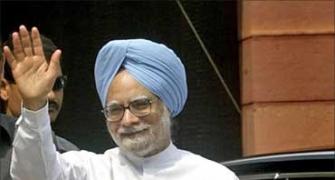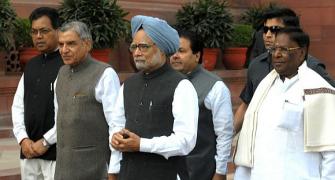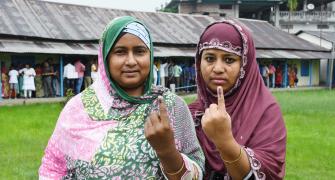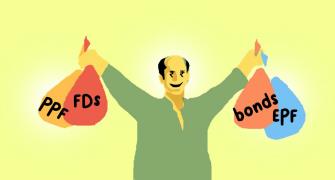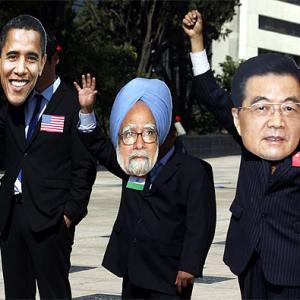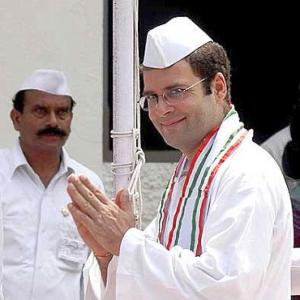The presidential elections were supposed to expose the fault lines in the ruling United Progressive Alliance. It was touted to be a make or break, mostly the later, for the UPA. Of course, it all began with some of its allies playing as per script by initially threatening to break ranks. But when push came to a shove, all UPA allies "inexplicably" fell in place.
Contrary to initial calculation of political pundits that the presidential elections would lead to an early disintegration of the UPA, the ruling combine has actually gathered strength numerically, emerged stronger politically and is seen now as impregnable ideologically. Crucially, it is the opposition that was supposed to go for the kill that has lost numbers and runs the risk of disintegrating.
Now as the dust of this election settles down, one understands that the noise generated in the run up to the presidential elections was not one of allies protesting, but were in fact grimaces. Only those who have suffered extreme pain in silence will understand what I am attempting to explain. What else would explain the sudden turnaround of allies who were initially "cornered," then "silenced" and subsequently forced to "fall in line."
Of course, if the allies are to be believed -- be it the Trinamool Congress or the Samajwadi Party or the Nationalist Congress Party -- the Congress has repeatedly given them a short shrift. So much so that leaders of these parties allege that they are ignored, humiliated and therefore threatening their very existence.
Yet, none of them have done anything more precious than providing a nominal protest! Inexplicable isn't it?
Perfected statecraft
For the uninitiated, it is now clear that the SP (or for that matter the Bahujan Samaj Party) can be brought around within twenty-four hours. Needless to emphasise, a bit of help from the Central Bureau of Investigation makes it faster and smoother. As regards the TC, well it is a slightly complicated process -- the very threat of the Congress attempting to build bridges with its political adversary -- the Left -- ensures that the TC will ultimately behave.
Given the skeletons in the cupboard of the NCP, all one has to do is simply hint at the law of the land taking its own course -- the party will do anything for the Congress. As regards the Dravida Munnetra Kazhagam, another "valued" ally is caught in the eternal dilemma of whether to confront the Congress or play ball with it. In the process it is doing neither and is increasingly seen by political observers as writing its own political obituary.
In short, allies can make noises, provide some entertainment and in turn ensure comic relief to the distressed nation. But expect nothing more. The Congress has magnanimously allowed its allies to go thus far, but not any further.
Did I hear someone say 'Hail Mogambo'. Obviously, someone within the Congress has elevated the art of statecraft into a perfect science. But if you thought it was all coercion of the CBI, the Intelligence Bureau and other state agencies, think again, for it not as simple as it seems on first blush.
Let me elaborate. Given the arithmetic of the present Lok Sabha for the UPA to fall, the TC, SP, NC and DMK have to come together and join hands with the Bharatiya Janata Party to vote out this government and perhaps join the National Democratic Alliance while facing the electorate next time around -- a political improbability if not impossibility given the state of affairs in the country.
The reason for the same is obvious -- voting with the BJP would leave each one of these parties with a taint of being non-secular if not being branded communal. Given the constituency profile and vote bank of most of these parties, it is "presumed" to be politically suicidal by the allies in their own calculation.
Naturally, each one dreads the very prospect of having to vote, much less politically tie-up with the BJP. And that makes the Congress absolutely omnipotent.
But where is the choice?
Implicitly, in an era of coalition politics dominated by the idea of secularism the allies have no choice -- either they do business with the Congress or are condemned to political oblivion. Each one of these political parties having played the secular card to the hilt is badly stuck.
And for that the allies have to blame themselves for having painted themselves into a corner. It is this weakness in their armour that is being exploited by the Congress to the hilt.
So in Uttar Pradesh, irrespective of the fact whether it is the SP or BSP that will emerge victorious at the hustings, it is the UPA that will win. So a Congress defeat in UP means nothing for the UPA. Only the share of individual parties remains to be decided which ultimately will decide whether Mulayam Singh will be our next defence minister or whether Mayawati will be our next home minister!
West Bengal is another case in point. If Mamata breaks ranks with the UPA, the Left will immediately be ready to do business with the Congress. The Congress knows it for neither the Left nor the TC can do any political business with the NDA. That means in effect the Congress can ally either with Mamata or the Left, mostly the later. In such a scenario the UPA is assured of a good number of seats in West Bengal as it would be in Kerala.
Andhra Pradesh is yet another state where the Congress may well lose to the newly formed YSR Congress. Yet, the YSR Congress given its electoral compulsions cannot align with the NDA. The Congress or the YSR Congress, would mean no difference to the UPA. That explains why despite being incarcerated by the Congress, Jagan has gone along with the UPA in the presidential elections.
So in effect it is a catch-22 situation. Secularism, that was a politically rewarding a few years ago is now turning out to be an albatross around the neck of most UPA allies. It is a political equivalent of a checkmate in a game of chess. And in this game despite losing all its pieces, the Congress may well emerge victorious.
Put bluntly, secularism -- whatever it means -- has frozen our polity. It has reached an absurd level, from the perspective of regional parties, that they have no choice but to be perennially supporting the Congress. Most regional leaders now realise in this game of real politics they are reduced to playing the role of a sidekick.
Consequently a Mamata is allowed the luxury of shouting -- grimacing if you may pardon my expression -- nothing more. But she will not jettison the UPA for she knows that the Left -- her political bete noir -- is precisely waiting for that moment to resurrect itself. The compelling reason for other UPA allies -- the DMK, SP, BSP, NCP and others to be with the Congress are more or less similar. Competitive local politics ensures that they have no option but to support Congress.
Interestingly, the Congress may seek the support of the BJP in case of passing crucial legislations in Parliament or the constituents of the NDA in garnering support for its presidential nominee. But such a luxury is not available to the other constituents of the UPA.
Of course all this will change should the the BJP get anywhere more than 180 seats. As someone put it brilliantly, the BJP is a secular party if and only if it secures more than 180 seats -- the threshold required to be achieved by it for regional parties to do business with it.
For that the BJP has to raise its vote share from approximately 18 per cent to well above 25 per cent. And given the fact that it has peaked in most of its bastions like Karnataka, Gujarat, Madhya Pradesh and Chhattisgarh, it is indeed a tall order. No wonder, most regional parties dismiss the electoral prospects of the BJP. That in turn explains why the BJP is considered communal even to this day.
Given this paradigm, it is obvious that as the winner of the presidential elections is not Pranab Mukherjee as is widely believed, but Prime Minister Dr Manmohan Singh. The reason is not far to seek.
Slowly it dawns on the allies that they have no option but to remain with the UPA. That would mean as and when the elections are held, the composition of the UPA may change, yet the UPA could well emerge as a winner. And should that happen the UPA under the leadership of Manmohan Singh could well be credited for winning elections for an unprecedented third term.
With such a remarkable electoral success it means that a person who has won three consecutive terms will have to be necessarily be our PM. Does that not imply that we are all condemned to another term of the UPA under the leadership of Dr Singh.
PS: The Congress leadership perhaps sees the inevitability of all this. Is that why the party is in a hurry to replace Dr Singh with Rahul Gandhi?
The author is a Chennai-based chartered accountant.

